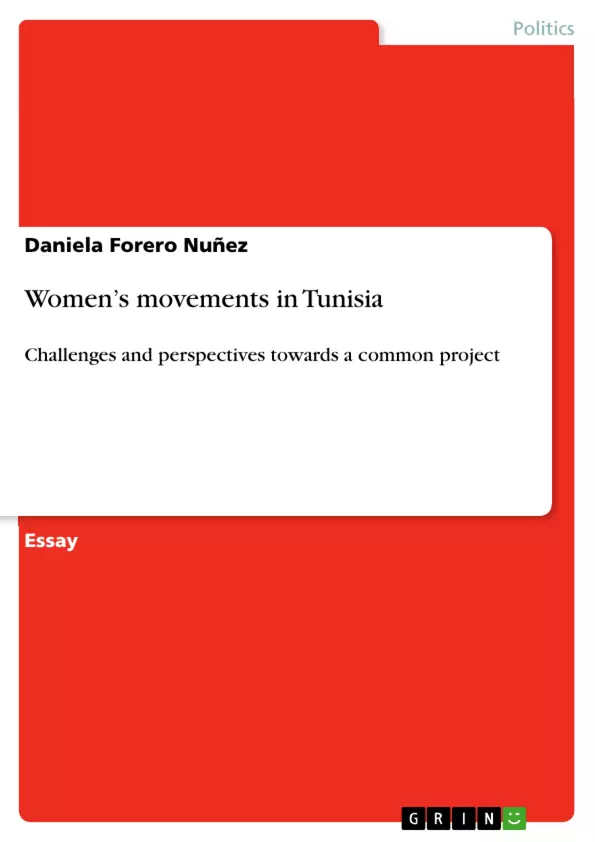Tunisian women’s movements are anything but homogenous. Grassroots women’s movements and new forms of feminism have been competing against a top-down feminist project promoted by the state. Hence, tensions between the different understandings of a women’s rights agendas have clashed, making room for new conceptions of Tunisian womanhood, resistance, and empowerment. The dichotomy between “contemporality” and “tradition” might have hindered women’s collective empowerment and the formation of an all-encompassing movement. Nevertheless, Tunisian women are still capable and encouraged to build bridges between the diverse women’s projects and continue to demand tangible gender equality, especially concerning decision-making positions. This diversity in perceptions, as well as the enthusiasm to prove the compatibility between a women’s project seeking gender equality and Islamic tradition, constitute one of the most valuable potentials of Tunisian women’s movements. This might even result promising for the women’s cause in the first place, considering that there is sufficient common ground among the intrinsic principles and objectives of women’s movements around the world. Other women’s movements in the phase of consolidation can thus learn important lessons from the Tunisian example.
The following segments will briefly recapitulate some of the most relevant historical milestones of Tunisian history while acknowledging their interconnection with the evolution of Tunisian women’s movements over the decades. Special attention will be drawn to the consolidation of grassroots, state-independent women’s movements in post-revolution Tunisia, and to the necessity of reconciling the heretofore contesting women’s projects. This, with the motivation to understand: what challenges have Tunisian women’s movements faced thus far and what perspectives do they have to build a more consolidated project?
Inhaltsverzeichnis (Table of Contents)
- Introduction
- Historical background: State feminism vs. grassroots women's movements
- Evolution of women's movements in post-revolution Tunisia and the clash between “contemporality” and “tradition”.
- The heritage of Islam for Tunisian women's movements.
- Conclusion: Towards a collective Tunisian women's project? The need of building bridges.....
Zielsetzung und Themenschwerpunkte (Objectives and Key Themes)
This paper examines the evolution and challenges faced by women's movements in Tunisia, particularly in the context of the 2011 Jasmine Revolution. It aims to understand the interplay between state-led feminist initiatives and grassroots movements, highlighting the tensions between "contemporality" and "tradition" in shaping women's rights agendas. It also explores the potential for building a collective Tunisian women's project that addresses the diverse perspectives and needs of women in the country.
- The historical evolution of women's movements in Tunisia, contrasting state feminism with grassroots initiatives.
- The impact of the Jasmine Revolution on women's activism and the renegotiation of their identities and status.
- The influence of "contemporality" and "tradition" on women's rights agendas and the potential for conflict between different understandings of women's empowerment.
- The role of Islamic heritage in shaping Tunisian women's movements and the search for common ground between different women's projects.
- The challenges and opportunities for building a more consolidated women's movement in Tunisia, including the need to address issues such as access to employment, inheritance rights, and gender-based violence.
Zusammenfassung der Kapitel (Chapter Summaries)
- Introduction: This chapter sets the stage for the paper by outlining the context of women's movements in Tunisia, highlighting the impact of the Jasmine Revolution on women's activism and the need to address ongoing challenges such as unequal access to employment and inheritance rights.
- Historical background: State feminism vs. grassroots women's movements: This chapter explores the historical evolution of women's movements in Tunisia, tracing the development of state-led feminist initiatives alongside the emergence of grassroots organizations. It highlights the tensions between these different approaches to women's rights and the influence of Islamic tradition on these movements.
Schlüsselwörter (Keywords)
The key terms and concepts in this paper include women's movements, state feminism, grassroots activism, Tunisian women's rights, "contemporality," "tradition," Islamic heritage, gender equality, and challenges and perspectives towards a collective women's project in Tunisia.
Frequently Asked Questions
How diverse are women's movements in Tunisia?
Tunisian women's movements are very diverse, ranging from state-promoted "top-down" feminism to grassroots initiatives and new forms of Islamic feminism.
What is the conflict between "contemporality" and "tradition"?
This dichotomy refers to the clash between modern, secular understandings of women's rights and those rooted in Islamic tradition and cultural heritage.
How did the Jasmine Revolution affect Tunisian women?
The revolution in 2011 led to a surge in grassroots activism and a renegotiation of women's identities and status within the new political landscape.
Is gender equality compatible with Islamic tradition in Tunisia?
The paper highlights the efforts of many Tunisian women to prove this compatibility, seeking to build bridges between religious values and gender equality goals.
What are the main goals of modern Tunisian women's movements?
Key demands include tangible gender equality in decision-making positions, fair inheritance rights, and better access to employment.
- Quote paper
- Daniela Forero Nuñez (Author), 2022, Women’s movements in Tunisia, Munich, GRIN Verlag, https://www.hausarbeiten.de/document/1267312


